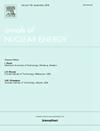A fuzzy logic-based coordinated adaptive control method for megawatt novel nuclear power systems
IF 1.9
3区 工程技术
Q1 NUCLEAR SCIENCE & TECHNOLOGY
引用次数: 0
Abstract
The megawatt novel nuclear power system (MNNPS) employing heat-pipe reactors and sCO2 Brayton cycles has significant applications. However, the unattended operating environment places high demands on the adaptive capability. In this paper, a fuzzy logic-based coordinated adaptive control (FL-CAC) method for MNNPS is proposed. The key to the method is to design fuzzy logic controllers with the current loop-controlled variable as the main-input and the remaining loop-controlled variables as the auxiliary-inputs, and to realize the coordinated adaptive adjustment of control parameters by comprehensively considering the operating status in control loops. The FL-CAC method was verified under typical operating conditions such as step and ramp load change transients. The simulation results demonstrates that it can significantly improve the control performance compared with the original control scheme. This study can provide a theoretical reference for the autonomous and reliable control of MNNPS which need to operate in an unattended environment.
基于模糊逻辑的百万千瓦级新型核电系统协调自适应控制方法
本文章由计算机程序翻译,如有差异,请以英文原文为准。
求助全文
约1分钟内获得全文
求助全文
来源期刊

Annals of Nuclear Energy
工程技术-核科学技术
CiteScore
4.30
自引率
21.10%
发文量
632
审稿时长
7.3 months
期刊介绍:
Annals of Nuclear Energy provides an international medium for the communication of original research, ideas and developments in all areas of the field of nuclear energy science and technology. Its scope embraces nuclear fuel reserves, fuel cycles and cost, materials, processing, system and component technology (fission only), design and optimization, direct conversion of nuclear energy sources, environmental control, reactor physics, heat transfer and fluid dynamics, structural analysis, fuel management, future developments, nuclear fuel and safety, nuclear aerosol, neutron physics, computer technology (both software and hardware), risk assessment, radioactive waste disposal and reactor thermal hydraulics. Papers submitted to Annals need to demonstrate a clear link to nuclear power generation/nuclear engineering. Papers which deal with pure nuclear physics, pure health physics, imaging, or attenuation and shielding properties of concretes and various geological materials are not within the scope of the journal. Also, papers that deal with policy or economics are not within the scope of the journal.
 求助内容:
求助内容: 应助结果提醒方式:
应助结果提醒方式:


